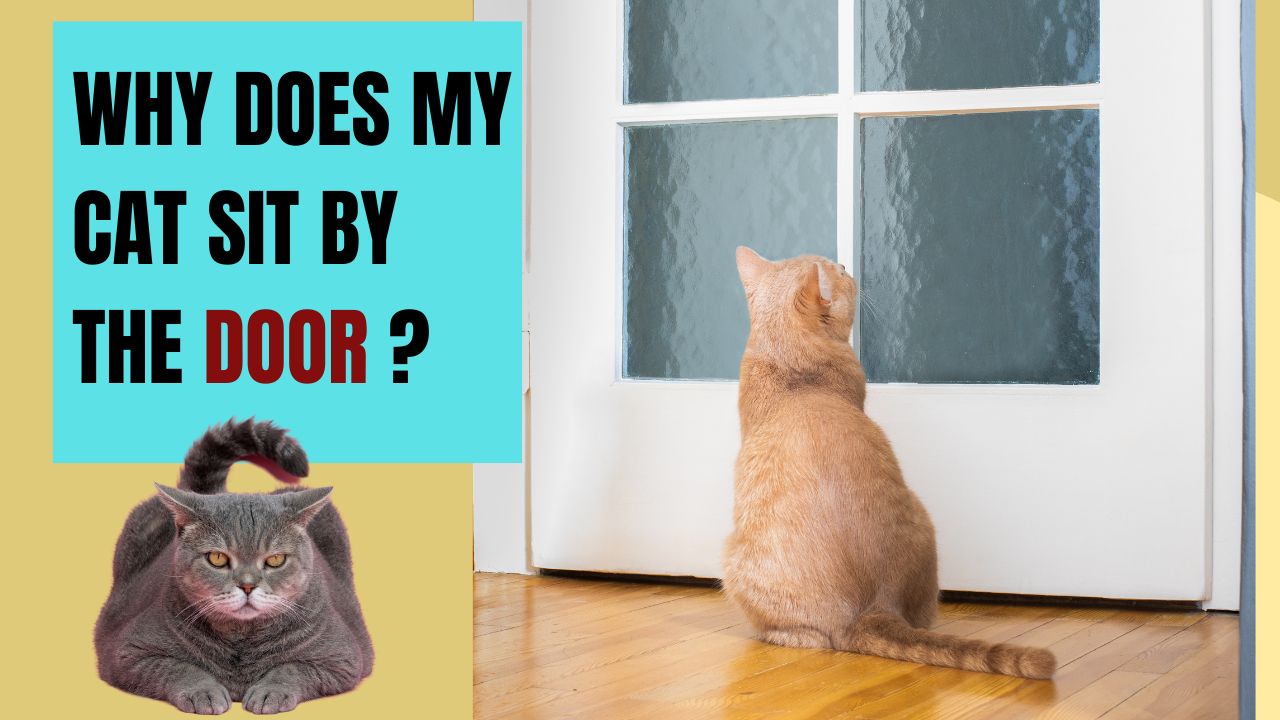
Why does my cat sit by the door? If your cat has been sitting by the door lately and you aren’t sure why you’re not alone. Many cat owners have wondered the same thing, and you may wonder if your cat is trying to tell you something or how they can get your attention to communicate something they cannot verbally express themselves. Of course, there are several reasons why your cat might be sitting by the door, such as wanting to go outside or even looking forward to their next mealtime with their owner!
1- He’s Hungry
If your cat is meowing and staring at you through a closed door, it may be that he’s hungry. Consider whether you’ve fed him recently. If he doesn’t get fed regularly throughout the day or if he only gets fed once or twice a day, then your cat could be thinking about dinner when dinner time has long since passed. If you can provide him for free (that is, don’t have to open a can of food or pay for water in addition to his dry kibble), then there’s no harm in opening up a small amount of wet food to put on top of his dry food as an appetizer while giving him plenty more later on.
2 – Expectation
Cats have a sense of expectation, and they can sit and wait. If you’ve spent time training your cat to come when called, you know it can take several repetitions before your furry friend learns what it is you want him to do. This being said, if you let them out into another part of the house or an enclosed space, they will most likely sit by a door waiting for you to open it so they can come back in. Even though they cannot speak, it is as if they are saying I’m ready! I’m ready!
3 – Stressed/Anxious
Cats can be very stressed by change. This can include changes in their home, litter box, or behavior. Adopting a cat may take a while to get used to your home, which may make them anxious. However, your cat may be stressed if there’s a new baby in the house or you recently got a pet dog or moved into a new home. Cats are creatures of habit, and if one part of their lives are disrupted, it could also lead to stress in other areas, causing them to either leave your home (in search of calm) or guard what’s left from anything that might disrupt it even more!
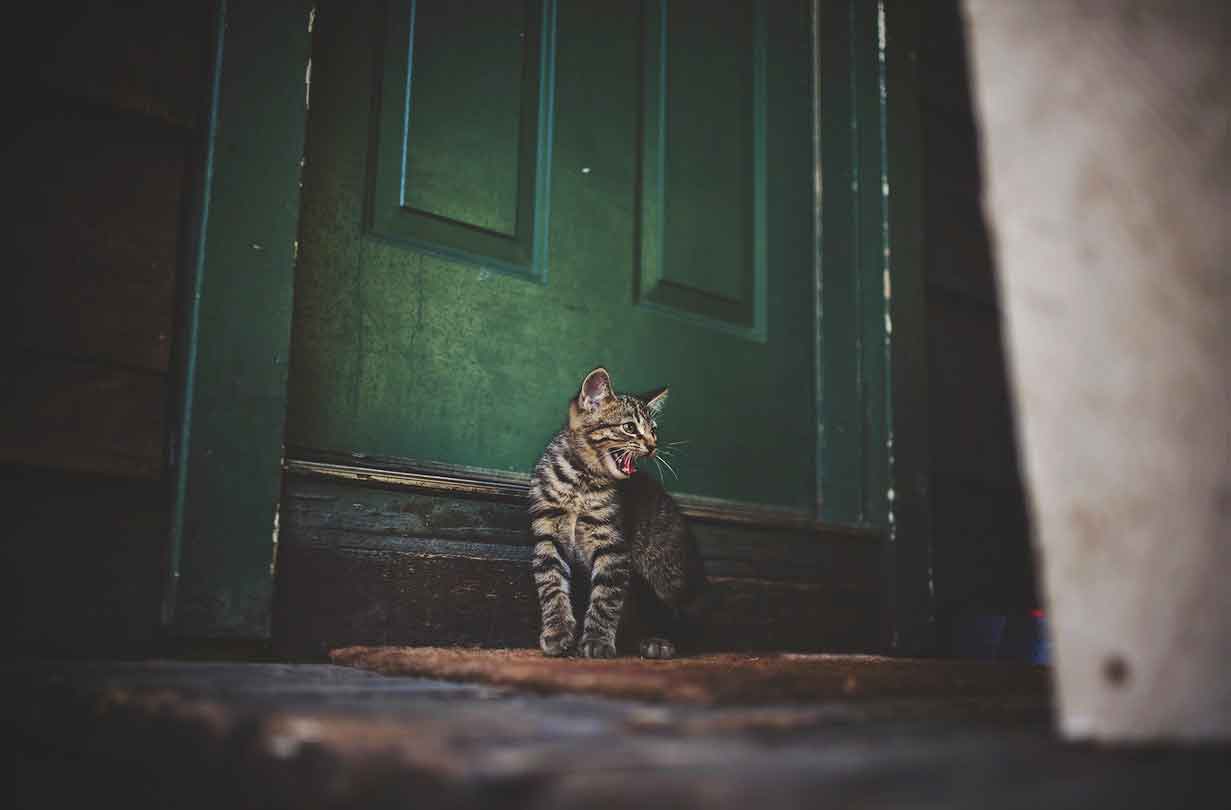
4 – Something Outside Is There
Is your cat clawing at your front door? It may be because they smell something interesting on your porch. Cats can have a sense of smell up to 100 times more potent than humans, and if they smell food or another animal, they will want to check it out. Do you leave food out for them when you’re away? If so, that might be why there are knocking at your front door! Don’t feed them outside, though – cats shouldn’t eat wet food left out in the heat for long periods because it’s not good for their stomachs and can lead to health problems.
5 – Loneliness
Cats are solitary creatures, but that doesn’t mean they like being alone. If you’re gone for long periods, your kitty may be sitting by your door to welcome you back with a loving purr and a rub against your leg when you arrive. Some experts say cats also sit by doors because they like people to pet them when they walk past. Who can blame them? Stroke their furry little heads as soon as you get home! It’ll make both of you feel better.
6 – A Fight With Their Human Companion
While cats sometimes sit by a door because they don’t like to be alone, more often than not, they want to get outside. Cats are known for their curious nature and can get bored quickly. This, combined with their instincts, means that cats love exploring and interacting with other animals. If you notice your cat sitting by a door frequently, it may be time to let them roam freely or give them something entertaining like a toy or treat puzzle to keep them occupied while you’re out of sight.
7- He Needs To Pee (Or Poop)
If your cat sits at or near a door and seems restless, take him to his litter box. He may have to use it, even if he doesn’t have to go #1. Your cat may also be trying to get you to come with him. If you see your kitty sitting by or scratching at a door, that could mean he needs help with his litter box or wants extra attention from you. Cats are spotless animals and enjoy their homes (and litter boxes) being neat and clean. They will not use a dirty litter box, so it is up to us as pet parents! So if your cat has been in one spot for more than an hour, then it’s time for some maintenance on his end!
8 – Sickness
If your cat has a stomachache or a respiratory infection (not to mention any other illnesses), they may need to go outside, which means you will likely see them sitting at the door waiting for you to let them out. However, it is essential that if your pet seems sick and isn’t eating that you take them to your vet as soon as possible. Like people, cats get sick and can sometimes go into shock when they are not feeling well; going outside should be something that happens naturally when your kitty needs it. Once they are better, however, make sure your cat stays indoors until further notice; having an outdoor cat puts him in danger of all kinds of nasty things, including poisoning, injury, and other dangerous wildlife encounters.
9) Something (or someone) Out There Is Scaring Him
Cats are very territorial creatures and can be pretty skittish, especially when they’re not sure what’s outside their home. With windows, that becomes more likely as you can’t see through them and have no idea if a predator is lurking nearby. If your cat sits by a door or window for a long time (more than 30 minutes), it may be time to investigate. It could just be that there’s something out there, and you can help him feel safe again. Once he feels secure in his territory again, he won’t need to sit by doors waiting to run away from whatever scared him, which will make both of you happier!
10 – They’re Watching something
So…you think your cat is patiently waiting for you to get home because they’re crazy about you? Not exactly. Cats (and other animals) will often sit by a window or door and stare off into space, watching something that no one else can see. This could be another pet in your yard, a bird flying by, or even a bug outside. Your cat is watching something specific—you can’t see it from where you are sitting. And, of course, cats are naturally curious creatures who enjoy seeing what’s going on around them. Nothing wrong with that!
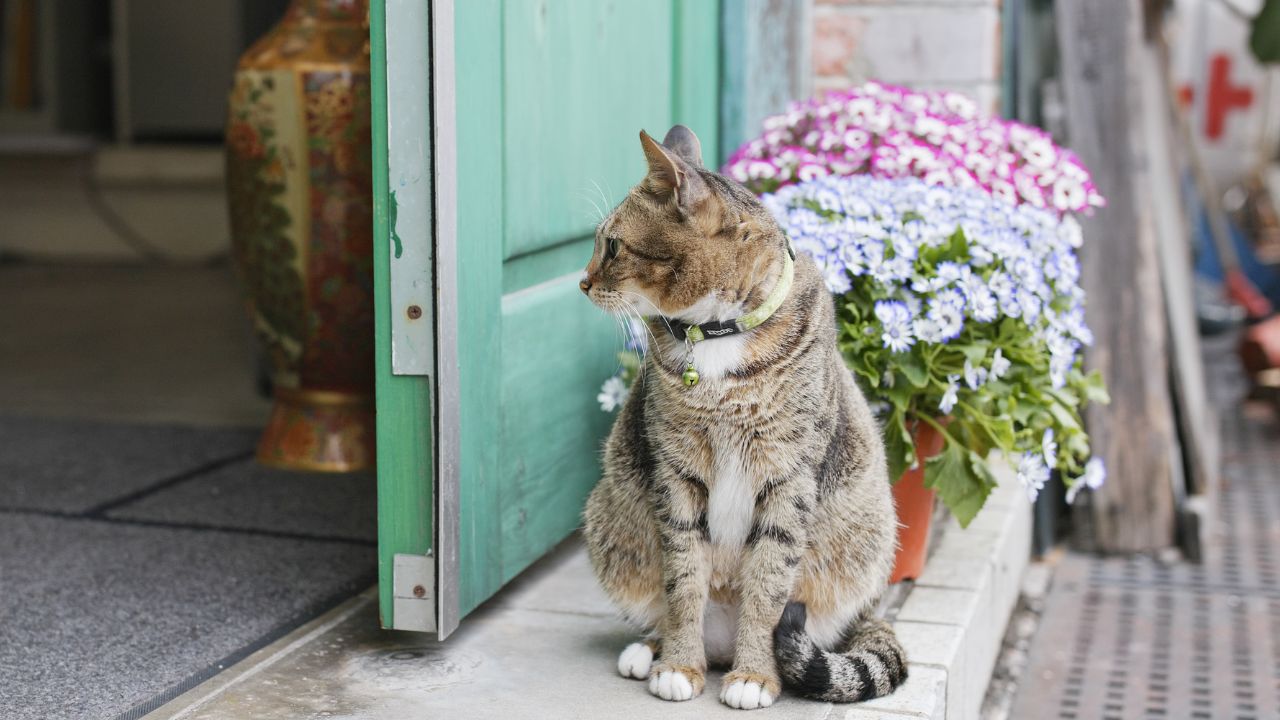
Is your cat sitting by the door constantly? Here are 10 potential solutions to help solve the problem.
Cats are well known for their need to be let out in the middle of the night, but not all cats sit patiently by the door waiting to be let out. If your cat keeps sitting by the door, it’s essential to determine why they feel the need to do so. Here are 10 possible reasons your cat sits at the door and 10 potential solutions to help solve the problem.
1) A trained cat may still want to be in control
Training is a beautiful experience for you and your pet, but as with all training, we must remember that we need to be able to maintain our lead over our pets. For example, you mustn’t give up if your cat breaks its training after a few hours or even days of success (cats can be moody). So when teaching a new behavior or breaking an unwanted habit, try not to get discouraged if things take longer than expected. This will keep both you and kitty on a positive note and ensure everyone remains happy!
2) Cats may be anxious about the environment
First and foremost, a cat may be anxious or afraid of something in its environment. This is especially true with indoor cats that don’t get to go outside very much (or at all). It could be loud noises, too many people coming in and out of your house, or significant changes in routine like suddenly taking your cat to a new place like a vacation home or kennel, etc. Anything that makes an indoor pet feel less secure can lead them to choose a location for hiding that makes them feel safe. An excellent way to ensure you know what’s causing anxiety for your pet is by keeping track of where they hide and when they do it, so you have time on hand when troubleshooting why they’re picking certain spots or locations over others.
3) Something may have changed within the household
Cats can get anxious when their routine is disrupted, or something new is introduced into their environments, such as a pet or small child. In these cases, environmental changes may be needed for the kitty to feel comfortable again and move away from her door-watching. You can test whether a change of scenery will make the kitty feel better by opening another exit—for example, placing another box with an open side on top of the kitty’s current favorite spot and observing her reaction. If she isn’t distracted by a different exit and goes right back to watching that other doorway, she may have something else behind that door!
4) We should understand cat logic
Sometimes cats act weird, but there’s usually a logical explanation behind their behavior. For example, my cat Belle sits by my closet every day. I initially thought that she wanted me to let her out or needed something in there. Neither is true (she has an outdoor litter box and isn’t interested in anything I keep in there). She likes being underfoot while I get ready for work in the morning; it keeps her from getting lonely when I spend so much time at work during the week and prevents me from being lonely when I come home after a long day at work.
5) Providing more things for them to do
Pets need entertaining just like humans do, but they often don’t know how to amuse themselves without getting into trouble. Many pet owners think their cats or dogs can entertain themselves while they aren’t home, but that isn’t true. If you have a pet sitter, make sure they play with your pet or let them out regularly; if you’re at home all day, set up several ways to get exercise and tire yourself out before bedtime. This will make it much more likely that they stay asleep when you leave for work in the morning so that nothing happens when you return home at night.
6) Provide comforting and convenient places for them
As a kitty parent, you want your feline friend to feel warm, comfortable, and safe. You can take steps to ensure they do just that at home with a few simple additions and accommodations: Place their food and water in a spot that’s easy for them to access but far from other tempting distractions like litter boxes or noisy appliances—including televisions. This will encourage them to eat more slowly, allowing their mealtime to be longer and more pleasant than it would otherwise be in an area filled with other stimuli.
7) They can become bored with their usual toys and activities
While you might be happy with putting away your fishing pole, your kitty may be less than thrilled with her loss of entertainment. Cats need regular exercise and playtime to stay happy and healthy, so if she’s used to getting some action in during a specific time of day, it could be that she’s trying to get you back into doing what you used to do. To solve a bored-kitty issue, add more enrichment activities to her schedule, like scratching posts or tree-branch perches that encourage natural climbing and hunting; she’ll have plenty of fun opportunities without relying on you for entertainment every single second of every day.
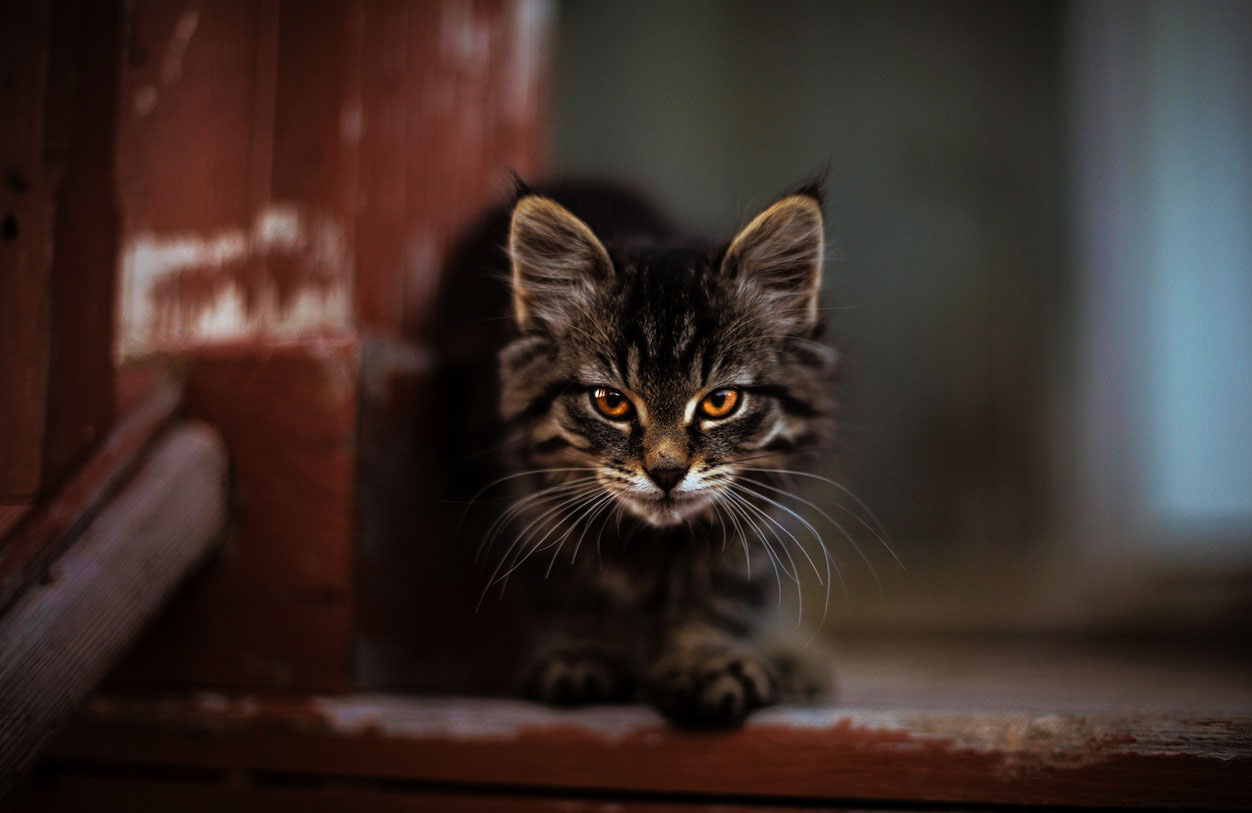
8) Your Neighbor Has New Pets Or Kids That He Doesn’t Like
Cats have millions of times more potent smell than humans, so if they can smell new pets or kids in your neighbor’s house, it could be an allergen or a cause for concern. Maybe your cat is waiting by the door because he wants to ensure you don’t get into an allergic reaction or another hazard when you go over there. In that case, let him out and keep him with you at all times to keep him safe from whatever might trigger his anxiety. Then try talking with your neighbor about what’s happening in their house and how they can prevent allergic reactions and keep your cat happy.
9) Give them a way out if something scares them
Sometimes, cats sit by doors because they’re afraid of something on either side of them. The goal is to find a way to feel safe outside their comfort zones without leaving their territories – and without making them feel locked in a room. For example, if you can see that bugs are scurrying around outside or snow is piling up, close off one side of a room so it doesn’t extend past where you can see from the inside (say, from an open window). Do that with both sides and leave just enough room for your kitty to get through; over time, move those barriers further and further out so they feel more comfortable going through it while increasing opportunities for safe exploration outside their comfort zones.
10) Change their routine slowly
If you have several cats and want to introduce another one into their territory, start teaching them slowly. Bring home one new cat at a time so they can adjust gradually; then, rotate between each new kitty every other day. They will feel like they’re adding a familiar face—and have time to get used to its scent—without feeling overwhelmed by several changes. And keep in mind, it could take up to two weeks for cats who know each other well enough but aren’t friends yet, to decide whether they like each other or not—so patience is vital when mixing cats!
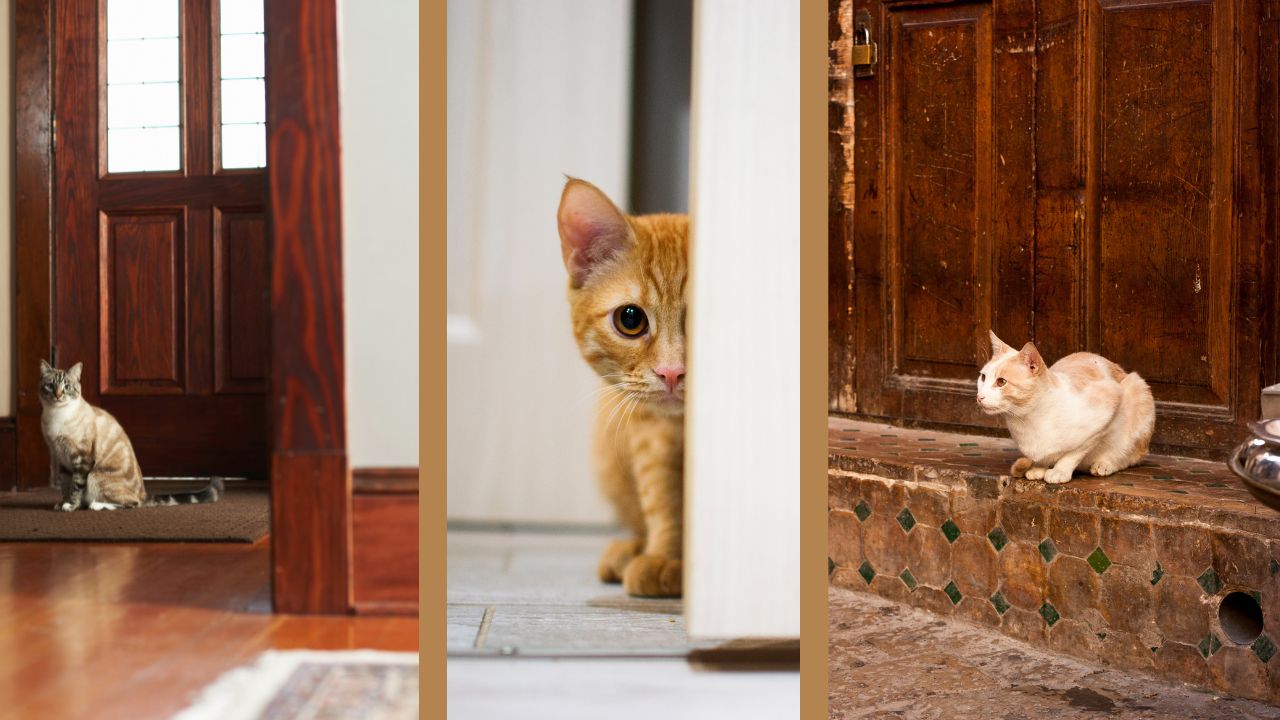
The answer to the age-old question: why does my cat sit by the door?
It’s no secret that cats are intelligent, but even the smartest of cats do some pretty strange things sometimes, right? One of these behaviors involves sitting near the door and scratching at it before you go out or return home as if to say Hey! Come here! Look at me! I did this thing that made you happy! Depending on the circumstances and your mood, this behavior can be both endearing and slightly irritating. Don’t worry, though; we’ve got answers to all your questions about why does my cat sit by the door?
What Is This Strange Behavior Anyway?
It turns out that there’s a specific feline ritual at play. When you’re hanging out with your cat and notice them sitting in front of your front door, you might wonder what they’re up to—this is something we’ve all noticed. You see, cats have an instinctive behavior called soliciting attention. This is when they use subtle behaviors or gestures (like sitting in front of a door) to get their humans’ attention so they can be rewarded for it. What kind of reward? Well, in most cases, it’s going to be something like a petting session (which lets them mark you as part of their territory), some verbal praise (good boy!), or maybe even some food if you’re lucky!
Why Does My Cat Sit By The Door?
Do you know why your kitty naps in front of your front door all day? According to experts, he’s probably just trying to beat you home. A recent study on feline behavior at North Carolina State University looked into what motivates domestic cats when they spend their time sitting in one place. Researchers found that domestic cats tend to stay in areas where their owners are most likely to return first after a period of absence. So if your pet has spent days sleeping outside your closet or under your bed, it may not be because she loves you so much—it may be because she’s hoping for a warm welcome.
What Does It Mean When Cats Sit By Doors?
Have you ever wondered what cats are trying to tell you when they sit by a closed door or window? Do they want outside, or do they not wish to go out? What’s their angle here, anyway? This video takes a look at some of those possible meanings. If your cat sits at a closed door and meows, it might mean they don’t intend to go outside—they want out of whatever room it’s in. Or if your kitty stops mid-meow while sitting by a closed window, it could be that he wants fresh air…but only from that spot. Whatever’s happening here is something we should all consider before reaching for our box of tissues.
Why Do Cats Sit by Doors and Windows?
When a cat finds a comfortable spot, she’ll settle down and gaze out of a window or into space. Often cats like to perch on one side of an entryway. Why do cats sit by doors and windows so much? What is it about that spot that makes it so desirable for felines? The reasons can vary from cat to cat, but these are some of your options.
How Can I Stop Cats from Sitting Near Doors & Windows?
To stop cats from sitting near doors and windows, ensure they are not being pestered by other animals living close to your house. It may be a dog or even another cat. Block their view of each other, so they can’t fight or stare at each other, which makes them feel like prey. Please provide them with plenty of toys and scratching posts, so they have something else to focus on. If you see them trying to look out the window often, block their view with plastic sheeting or decorative screens, so they don’t get stressed out from seeing what is outside. This can also help keep pests from sneaking in through your open doors if your kitty is doing her part!
How to Train Your Cat Not To Sit on the Doorstep or Stairs
Cats are natural hunters, and they love a good view. If you’re having trouble with your kitty sitting on your doorstep or stairs, try creating an outdoor environment that mimics a hunting experience. This could be as simple as purchasing some plants (or a bird feeder) to watch from a window or taking them outside for playtime in your backyard or on a screened porch. If you are concerned about them being exposed outdoors, try an indoor catio, an outdoor space built right inside your home! Bonus points if it’s nice enough that they might want to come back indoors after looking out into their playground all day.
Why does my cat sit by the door and meow?
As you’re probably well aware, your feline companion is a lover and fighter. He uses his soft purr (and more overt cries) to communicate everything from contentment to displeasure, frustration, and even hunger. If your kitty meows loudly and sits by the front door, don’t worry—he may not be saying goodbye—he could just be saying let me in! or feed me! or let me out! Cats typically will head butt open doors that are slightly ajar.
Why does my cat sit by the bathroom door?
It’s no secret that cats love bathroom time. A survey of 2,500 pet owners in Australia revealed that 60 percent of cats preferred spending time with their humans in the bathroom. The key word here is chosen. Not all felines get their wish, and they might attempt to punish you for denying them access. One way they do it is by sitting outside your bathroom door waiting for you to emerge; another is by meowing plaintively at your feet until you give in. Why do cats like hanging out near (or inside) bathrooms so much? It all comes down to their sense of smell, hunting instinct, and territorial behavior. Let’s break it down one element at a time!
random cat sitting in front of the door
If you’re a cat owner, you probably see your feline friend randomly sitting in front of doors. Sometimes she sits there for hours waiting for something, and you probably wonder what she is waiting for. At first glance, you may have thought she was waiting for someone else to come through that door or maybe even another animal, but nothing could be further from the truth. The reason behind her desire to sit at that spot by that specific door is more psychological than anything else and all about marking her territory.
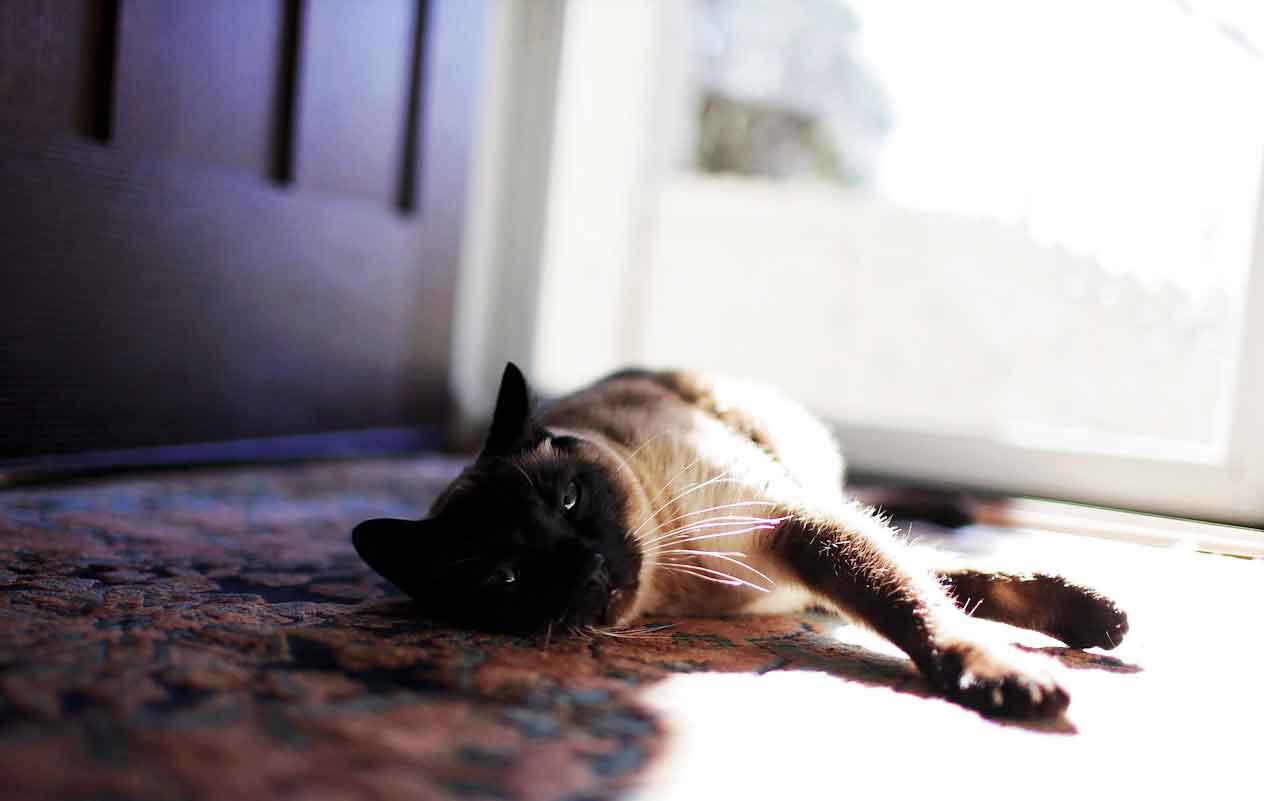
Why does my cat sit outside my room?
Ever wonder why your cat insists on sitting outside of your room in such a way that you can’t get past him without a confrontation? Does he have you under house arrest, or is he protecting something from someone else, like his territory or his treasure trove of belongings? Or, maybe, he knows you better than you think and has seen how often you sneak out of your room at night, so he thought it prudent to put himself in between your destination and yourself. If you haven’t figured out why by now, we’ll give it away – it’s a combination of all three scenarios, but mostly because he loves you.
Why does my cat stare at me?
Cats are naturally curious animals and tend to watch what you do closely. They’re also smart enough that they learn things more quickly than dogs do, and, being so aware of what you’re up to, it should be no surprise that your cat is watching you. It could be trying to understand some of your behavior (maybe getting ready for bedtime) or observing its environment. Either way, give it a try if you notice your feline friend staring at something – whether it’s a person or an object. You might start an intriguing conversation!
Do cats guard their house?
This is one of many theories why your pet has decided you need protection from creepy strangers lurking around your doorstep. Not all cats choose this position, however, so it’s not as expected behavior as some would have you believe. It also doesn’t appear that sitting in front of a door makes your home safer than another spot on its perimeter. As far as we can tell, there’s no way of knowing if a guard will be a good or bad choice for guarding your home—but they are pretty cute and make great companions. 🙂
cat blocking door
Cats have a variety of reasons for blocking a doorway, says Kit. The simplest—and most common—is that your cat wants to be somewhere else. He’s likely getting up in your face as you walk toward him because he’s trying to get you out of his space and into another room. But cats sometimes block doors because they want privacy, says Kit. Your kitty might not like it when someone comes in or goes out of an adjacent room, so he may simply be trying to keep all traffic out while he sleeps on his bed or uses his litter box.
Why does my cat follow me everywhere?
To understand what is going on with your cat, you should first understand how cats communicate. Cats use a complex language of sounds and motions when speaking with each other. When your kitty moves quickly from point A to point B, he sends you signals. Sometimes, he may be trying to show dominance or simply wanting something from you (typically food). If he’s sitting at your front door for long periods and acting like a sentinel guard dog, then there’s probably something outside that has caught his interest – which could be another animal nearby.

